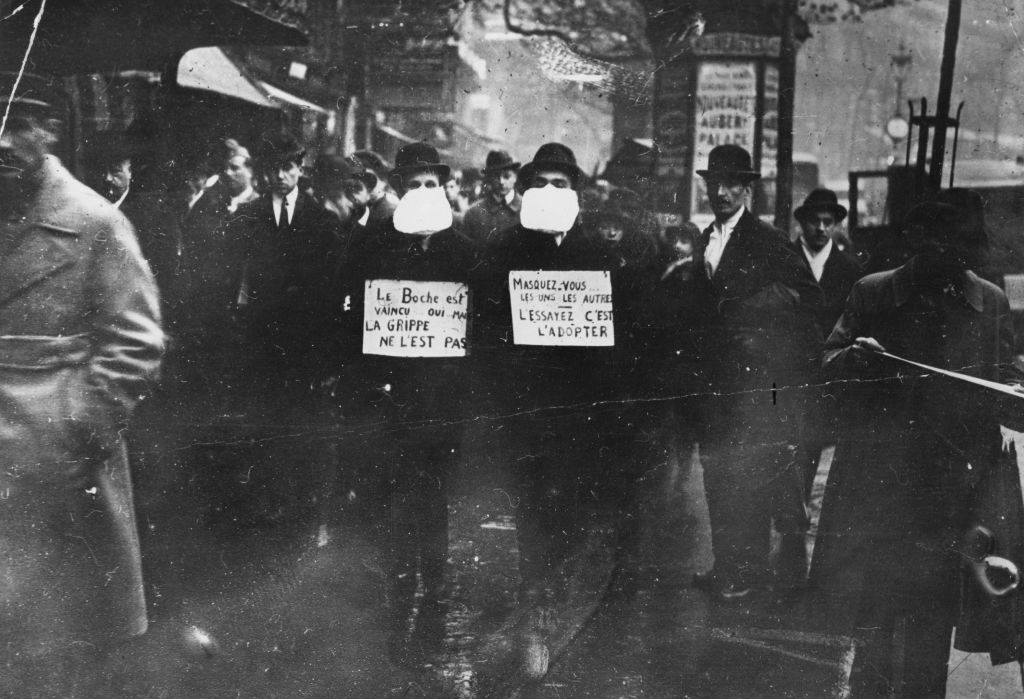There’s an ongoing debate in the media as to whether or not president Trump is being ‘racist’ by repeatedly referring to Covid-19 as a ‘Chinese’ virus. ‘It’s not racist at all,’ Trump insisted at one press conference. ‘It comes from China, that’s why.’
This is at least objectively true – unlike the case with Spanish Flu, which didn’t come from Spain at all. In fact the 1918 pandemic – which killed an estimated 50 to 100 million people around the world – most likely originated in the flat, treeless cattle country of Haskell County, Kansas, west of Dodge City. But it was never known as American Flu. Why?
The strange reason, I learn from John M Barry’s The Great Influenza – The Story of the Deadliest Pandemic In History, was that the USA in 1918 operated a censorship system almost as oppressive as China’s today. Not even the First Amendment seems to have offered much protection from the administration of president Woodrow Wilson, who ran America as a virtual police state, memorably characterised in one of Jonah Goldberg’s books as ‘Liberal Fascism’.
So even as this vicious strain of influenza began to take its toll across America, the US media did its best to play it down, lest it be seen as unpatriotic or to be undermining the US contribution to the First World War. ‘The so-called Spanish influenza is nothing more or less than old-fashioned grippe,’ claimed one, widely quoted expert in the newspapers. This kind of misinformation, borne of self-censorship, covered up the scale of the problem and made matters much worse. As Barry says: ‘[The press] terrified by making little of it, for what officials and the press said bore no relationship to what people saw and touched and smelled and endured. People could not trust what they read.’
And the reason they couldn’t trust what they read was because of the climate of anxiety created by Wilson. Wilson had put the US on a total war footing and ran the country almost like a totalitarian state. The postmaster general was given the power to refuse to deliver any periodical ‘he deemed unpatriotic or critical of the administration.’ A new Sedition Act made it punishable by twenty years in jail to ‘utter, print, write or publish any disloyal, profane, scurrilous, or abusive language about the government of the United States.’ Government posters urged people to shop – Stasi-like – anyone who spread ‘pessimistic stories.’
Meanwhile the FBI appointed an army of licensed bully boy snitches – a volunteer group called the American Protective League, 220,000 of them in all with ‘Secret Service’ badges. Across America their American Vigilance Patrols policed everything from ‘seditious street oratory’ to ‘slackers’, ‘food hoarders’ and people who hadn’t bought enough Liberty Bonds (theoretically voluntary; in practice, all but compulsory).
So it’s perhaps understandable, in this atmosphere, that American newspaper editors preferred to run tame stories about the importance of not being afraid – ‘Don’t let flu frighten you to death’; and apparently key advice on staying alive, like: ‘Remember the 3 Cs, clean mouth, clean skin, and clean clothes…Keep the bowels open…Food will win the war…Help by choosing and chewing your food well.’
But the press in the other warring nations such as Britain, France and Germany, was similarly geared towards ‘boosting morale’ rather than telling the truth. The big exception was Spain, which being neutral had a much freer press. When the flu hit Spain, especially when King Alphonse XIII fell seriously ill, the papers were full of it. It became known as Spanish influenza and Spanish flu because only Spanish papers were reporting on the pandemic honestly.
Barry’s book is well worth reading – perhaps in tandem with Laura Spinney’s Pale Rider: The Spanish Flu of 1918 and How It Changed the World – as an escape from all the miseries we’re suffering from our own pandemic. They’re helpful, not least, in consoling you with the thought that however bad it may seem now things were so much worse back then.
For a start, the Spanish flu was a lot more lethal. Some victims were dead within twelve hours of their first symptoms; and they died a lot more painfully and horrifically: their faces turned a livid blue (cyanosis), blood trickled, sometimes spurted, from their nose, mouth, even their eyes and ears; earache could be excruciating; sometimes they coughed so badly that the muscles along their ribcage were torn apart.
Worse, though, was that unlike Covid-19, Spanish flu killed not the old and weak but the young and strong. In South Africa, 60 per cent of those who died were between 20 and 40; in the US, the single greatest number of deaths was among men and women aged between 25 and 29; a Swiss physician ‘saw no severe case in anyone over 50.’ Hardest hit of all were pregnant women – the death rate for those hospitalised ranging between 23 per cent and 71 per cent.
When Laura Spinney and John Barry published their books two years ago to coincide with the centenary of the Spanish Flu, they must have had their work cut out making them seem relevant. Though Spanish Flu killed more people than the First World War, it has never attracted nearly the same interest or attention. This applied even to those writers who had lived through it: of the American greats, for example, neither John Dos Passos (who nearly died of it) nor Hemingway, Faulkner or Fitzgerald much mentioned it in their work. Before the coronavirus outbreak, it seemed little more than a quirky historical footnote.
I don’t think there is much danger of this happening with our own viral pandemic. On current form, it looks as if it’s going to be neither as ugly nor as lethal. But the economic, geopolitical and social damage it does, I’m sure, will occupy writers for many decades to come.







Comments